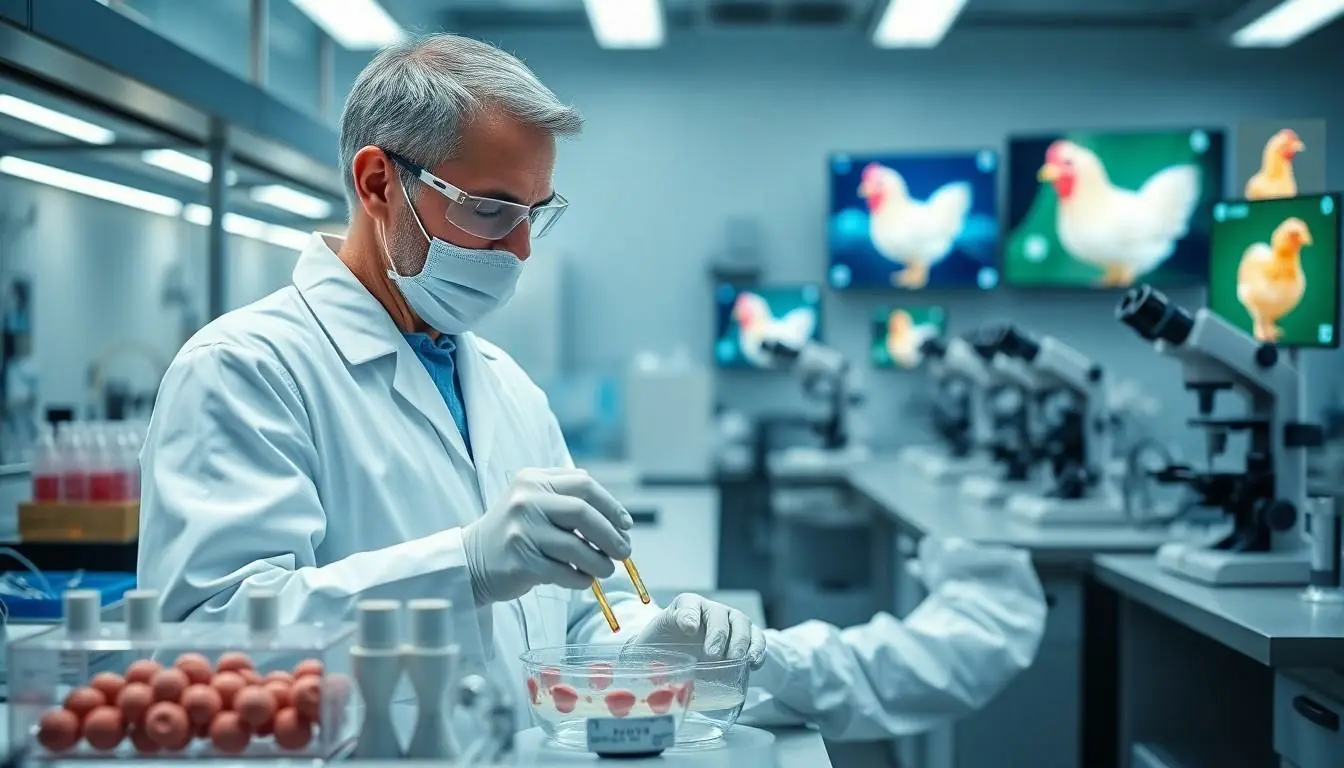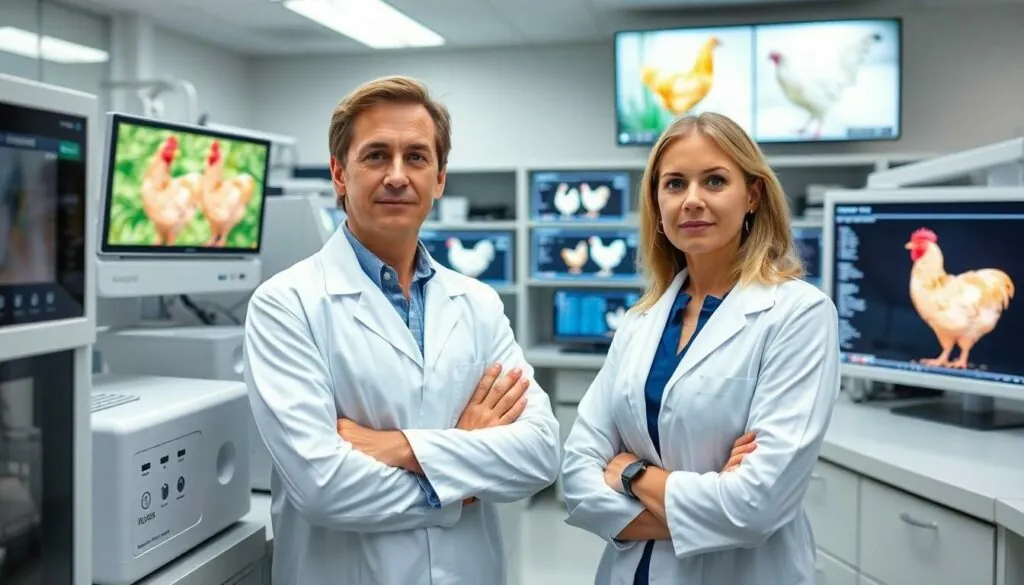Table of Contents
ToggleIn a world where technology meets nature, avian biotech is taking flight like never before. Imagine a future where chickens can lay eggs with enhanced nutritional profiles or where birds are engineered to help tackle environmental challenges. It sounds like something out of a sci-fi movie, but this fascinating field is already making waves in agriculture and conservation.
Overview of Avian Biotech
Avian biotech merges biology and technology, driving innovation in agriculture and conservation. This field specifically focuses on the genetic modification of birds, particularly chickens, to enhance egg production and nutritional content. Genetically engineered chickens now produce eggs enriched with omega-3 fatty acids and vitamins, meeting consumer demands for healthier food options.
Developments in avian biotech include creating birds that can withstand diseases, thereby reducing the need for antibiotics. This capability supports sustainable farming practices by minimizing disease transmission and promoting animal welfare. Innovations extend to conservation efforts, where scientists design birds with traits that help them adapt to changing environments, thus preserving biodiversity.
Collaboration among researchers, agribusinesses, and regulatory agencies accelerates advancements in this sector. By establishing guidelines and safety protocols, stakeholders ensure the ethical use of biotechnology in avian species. Rigorous testing and research validate the benefits of these technologies, addressing safety concerns for both consumers and the environment.
Global interest in avian biotech grows, driven by rising food production demands and the need for sustainable practices. Countries around the world are exploring opportunities to integrate avian biotech in agriculture. As this technology evolves, its applications extend beyond conventional farming, promising breakthroughs in ecological restoration and wildlife management.
Challenges remain in the regulatory landscape and public perception of genetic modification. Addressing these concerns requires transparent communication and comprehensive education about the benefits and safety of avian biotech. As the industry progresses, continued innovation and research will shape its future, positioning avian biotech as a cornerstone of modern agriculture and ecology.
Key Technologies in Avian Biotech

Avian biotech utilizes cutting-edge technologies to enhance poultry health and productivity. Innovations in genetic modification and vaccination contribute significantly to advancements in this field.
Genetic Modification Techniques
CRISPR technology transforms avian biotechnology by enabling precise edits in poultry genomes. Scientists use this method to create chickens with enhanced nutritional profiles, such as eggs high in omega-3 fatty acids. Other genetic modifications target disease resistance, leading to healthier flocks and reduced reliance on antibiotics. Furthermore, research focuses on developing birds that grow faster or resist common pathogens, addressing industry challenges. The integration of these techniques promotes sustainable farming practices while meeting consumer demands for quality nutrition.
Vaccination Innovations
Vaccination strategies in avian biotech evolve continuously, targeting specific pathogens that threaten poultry health. Novel vaccine formulations improve efficacy and reduce the frequency of vaccinations needed. For example, vectored vaccines utilize harmless viruses to deliver antigens effectively, enhancing immune responses in birds. Utilizing recombinant technologies generates more effective vaccine options against diseases like avian influenza. Enhanced methods contribute to flock health and minimize disease outbreaks, ensuring stable poultry production that aligns with food security goals.
Benefits of Avian Biotech
Avian biotech offers various advantages for agriculture and conservation. Innovations in this field significantly enhance poultry health and productivity, ensuring a more sustainable food supply.
Enhanced Disease Resistance
Genetically engineered birds exhibit improved disease resistance. This capability reduces reliance on antibiotics, which benefits both animal health and public health. Disease-resistant chickens can withstand various pathogens, minimizing outbreaks in poultry flocks. Innovations in genetic modification target specific genes responsible for susceptibility to diseases. Enhanced immunity not only protects individual birds but also contributes to the overall health of flocks. With these advancements, farmers can better manage disease challenges, leading to healthier production environments.
Improved Productivity
Productivity in poultry farming experiences a significant boost from avian biotech innovations. Genetic enhancements lead to improved growth rates and higher egg production. Chickens with optimized feed conversion ratios use fewer resources while producing more yield. This efficiency directly impacts profitability for farmers, allowing them to meet growing consumer demands. Additionally, healthier birds are less prone to disease, resulting in reduced mortality rates. Innovations like CRISPR facilitate precise genetic edits to amplify these benefits. Overall, advancements in productivity support sustainable and efficient farming methodologies.
Challenges Facing Avian Biotech
Avian biotech faces several significant challenges that impact its development and implementation in agriculture and conservation.
Regulatory Hurdles
Regulatory hurdles pose a considerable obstacle for avian biotech. National and international guidelines vary significantly, creating confusion for researchers and businesses. Agencies often require extensive testing and validation processes before approval. This lengthy approval process can delay innovative solutions from reaching the market. Each country’s stance on genetically modified organisms can further complicate international collaboration. Compliance with these diverse regulations adds cost and complexity. Navigating the regulatory landscape demands both time and resources, often discouraging investment in new technologies.
Public Perception Issues
Public perception issues significantly influence the adoption of avian biotech. Many consumers exhibit skepticism toward genetically modified organisms, fearing unknown effects on health and the environment. Media coverage often highlights potential risks rather than benefits, which skews public opinion. Effective communication strategies become essential to educate consumers about safety and advantages. Transparent dialogue regarding the ethics of genetic modification can help build trust. Engaging stakeholders in discussions and addressing concerns is vital for fostering acceptance. Overcoming negative perceptions requires consistent efforts and collaboration among researchers, companies, and advocates.
Future Trends in Avian Biotech
Anticipated advancements in avian biotech highlight a transformative future for poultry farming and conservation efforts. Researchers focus on enhancing genetic modification techniques, driving efforts to produce birds with improved resistance to diseases. Increasing interest surrounds the potential of CRISPR technology, which allows for precise genomic edits, leading to healthier chicken strains that meet rising consumer demands for quality.
Adoption of alternative feed sources also shows promise in avian biotech, with studies exploring the use of insects and engineered crops. These feed alternatives can boost nutritional profiles while promoting sustainability in poultry diets. Innovations continue to emerge in vaccine development, where researchers explore longer-lasting formulations that require fewer doses. This shift enhances flock health and reduces management costs for farmers.
Collaboration remains vital among stakeholders, including agribusinesses and regulatory bodies. Effective partnerships foster ethical research practices while streamlining the approval process for new technologies. Regulation adaptations may occur to facilitate innovation while ensuring safety and public trust in genetically modified chickens.
Public education on avian biotech solutions will be essential in overcoming skepticism. Increased transparency in research findings may cultivate consumer acceptance by addressing concerns regarding the long-term impacts of genetic modification. As the global population grows, the transition toward sustainable and productive poultry farming becomes increasingly urgent.
Emphasizing the benefits of avian biotech strengthens its role in modern agriculture. Innovations offer solutions to food production challenges while addressing environmental sustainability. The future of avian biotech promises to reshape the poultry industry, aligning with ecological goals while enhancing productivity and health in farming practices.
Avian biotech stands at the forefront of agricultural innovation. Its potential to enhance poultry health and productivity is reshaping the industry. By leveraging cutting-edge technologies like CRISPR and advanced vaccination strategies, the field is addressing critical challenges in food production and sustainability.
As global interest in these advancements grows, the importance of collaboration among researchers, agribusinesses, and regulatory bodies cannot be overstated. This teamwork is essential for ethical practices and effective communication with the public.
With ongoing research and development, avian biotech is set to revolutionize poultry farming. It promises not only healthier birds and more nutritious food but also a more sustainable future for agriculture. The journey ahead is filled with possibilities that can significantly impact both farming and conservation efforts.




